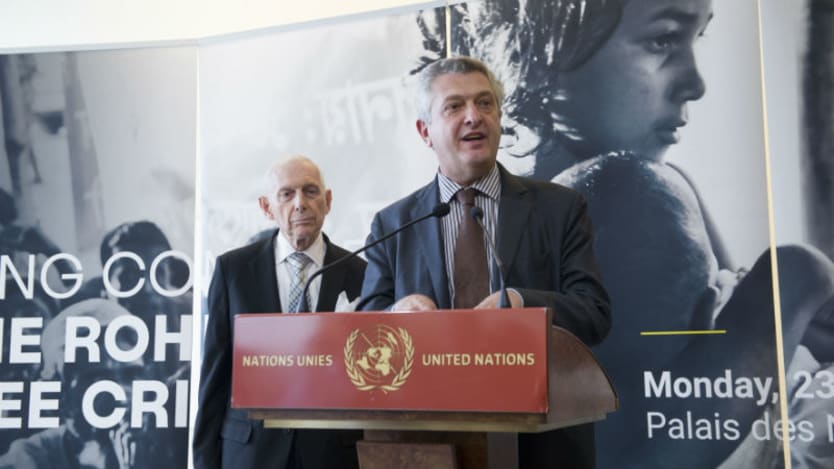
BANGKOK — On Monday, a host of countries and organizations came together to pledge about $200 million in new funding for the response of what is now being called the world’s fastest growing refugee crisis — the forced displacement of Rohingya from Myanmar. Though an exact sum for new commitments made on Monday is still unclear, a total of about 35 countries and organizations have now pledged $344 million in commitments for both Bangladesh and Myanmar responses since the crisis began on August 25.
Even if every commitment went directly toward the United Nations’ response plan appeal — and they won’t, as some donors specified pledges to go toward international nongovernmental organizations, bilateral programs, and other aid — the amount would still be about $100 million short of the $434 million required by the U.N. for the next six months.
Government representatives gathered in Geneva for the Rohingya pledging conference, many using their time at the microphone to denounce the atrocities being committed against the Rohingya population, condemn genocide, and acknowledge the burden the dramatic increase of refugees is placing on the government and people of Bangladesh.
U.N. High Commissioner for Refugees Filippo Grandi thanked Bangladesh for “having given an example to the whole world of keeping borders open to a population affected by very serious violations of human rights and protection issues.”
Grandi called for monetary support and resources to address “the inevitable gaps in this massive operation” during his statement at pledging conference, which was livestreamed and organized by the International Organization for Migration, UNHCR, and U.N. Office for the Coordination of Humanitarian Affairs.
As of Monday, $132.1 million in appeal funding has been received, according to OCHA’s Financial Tracking Service. Grandi encouraged those who pledged to “realize their pledges” as fast as possible, and reiterated that this humanitarian effort — and the money required to support it — is not likely to be short lived.
In the fastest exodus from a single country since the Rwandan genocide in 1994, more than half a million Rohingya Muslims have fled Rakhine state across the border to Bangladesh since late August to seek asylum from brutal military attacks, village razings, and sexual violence at the hands of the Myanmar military.
The resulting mass influx in Cox’s Bazar has placed immense strain on space in existing refugee camps in the already impoverished district of Bangladesh — as well as on aid budgets.
Several top donors to the crisis made additional commitments during the conference to amounts already pledged. The EU promised an additional 30 million euros ($35 million) for Rohingya communities in Bangladesh, on top of more than 21 million euros in overall EU assistance already allocated to Rohingya and host communities in both Bangladesh and Myanmar. It brings the total EU support for this year to more than 51 million euros, according to Christos Stylianides, commissioner for humanitarian aid and crisis management.
The U.K., which has led the pack for funds delivered thus far, pledged an additional 12 million pounds ($15 million).
“If the funding gap in the U.N.’s humanitarian response plan is not plugged, people, simply, will die,” the U.K. representative said during the conference.
Australia, meanwhile, put forward 10 million Australian dollars ($7 million), and Canada pledged 12 million Canadian dollars ($9 million). The government of Kuwait, which co-hosted the event, pledged $15 million, Norway put forward a $3 million pledge, Sweden promised $15 million in new funding, and Switzerland pledged $8 million, including a call to “get together and design and roll out the systems that we are needing.”
The U.N.-coordinated joint response plan calls for $434 million to assist 1.2 million people for six months, including new refugees, previous refugees, and host communities.
The request includes, among other things, $77 million for the U.N. World Food Programme, which is providing high-nutrition supplements, rice, lentils, and oil to refugees to assist 1 million people. Additionally, $84 million would go toward UNHCR to assist with what it has deemed a “level 3 emergency,” its most severe crisis alert. And UNFPA has requested $13.7 million to support 300,000 women of reproductive age with life-saving services, including deploying more midwives and establishing an increased number of women friendly spaces.
“As much as we hope there will be a quick solution in Myanmar with the voluntary return of the refugees, we must also help Bangladesh sustain the burden of a large presence in a very poor and disadvantaged area — possibly for some time to come,” Grandi said.
“I hope the Rohingya people who have been so lonely in their country for so long will feel a little less lonely today,” Grandi added.
Read more international development news online, and subscribe to The Development Newswire to receive the latest from the world’s leading donors and decision-makers — emailed to you free every business day.
Read more Devex coverage of the Rohingya refugee crisis
▶ Humanitarian agencies lobby against Rohingya 'mega camp' creation
▶ In Bangladesh, an unfolding humanitarian crisis
▶ Access greatest barrier to US response to Rohingya crisis
▶ Opinion: Here's how the international community should respond to the Rohingya refugee crisis
